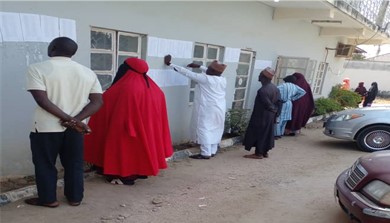Turning the Tide: Strengthening health training institutions in Bauchi state, northeast Nigeria
A variety of challenges confront health training institutions across Nigeria. Lack of befitting classrooms, teachers, and appropriate learning aids is especially apparent in Bauchi, a northeastern state of the country. Many students in Bauchi also rely on financial support from the state government, including monthly stipends that cushion the cost of their studies and contribute to facility upkeep for schools. In Bauchi prior to 2018, pre-service students at state-run health training institutions benefited specifically from the nicknamed “03” stipend, a monthly allowance of N 30,000 (USD $72.42) for students. Unfortunately, in June 2018, the state government stopped the payment of pre-service allowances due to a shortage of government funds needed to sustain the program.
Two years after the sudden halt of stipend payments to students at health training institutions, the United States Agency for International Development (USAID)-funded Health Workforce Management (HWM) Activity began a collaboration with the Bauchi State Ministry of Health (SMOH). The HWM Human Resource for Health (HRH) team commenced a series of advocacy meetings with the Bauchi SMOH on the need to revamp the stipend payment scheme.

HWM representatives met with the Head of Service, Civil Service Commission in Bauchi State, Alhaji Aliyu Jibo, who promised to take up the request with the Civil Service Commission. In October 2021, the HWM team expanded advocacy efforts to the legislative arm of the state government, specifically the Speaker of the Bauchi State House of Assembly Rt. Honorable Abubakar Y. Sleiman. After multiple consultations, the Speaker agreed to make a case to the Executive Governor of Bauchi state, Senator Bala Mohammed.
On January 10, 2022, the state government restored the pre-service payment scheme for a total of 1,058 students selected based on admission letters to the training institutions and certificates of origin verifying state residence. The beneficiaries included future nurses, midwives, medical laboratory scientists, radiographers, doctors, and pharmacists. Abdul Nadada, one of the students selected, was full of excitement upon seeing his name on the list.
“We thank [HWM] for pushing and helping us to get back the 03,” Abdul said. “We also thank our parents for supporting us during this period.”
Mujitapha Muhd Lawan, another beneficiary said, “I can’t express my gratitude. I appreciate Governor Kaura and those that pushed for this to happen.”
The aims of the partnership between the Bauchi state government and the HWM Activity also include improving the attrition and enrollment rates at state-run, health training institutions and further improving student performance in the long run through improved access to educational resources and quality instruction.
